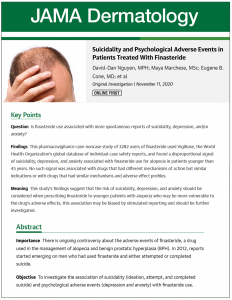Nov. 12, 2020
Dear Friends:
Men 45 years old and younger who use finasteride for hair loss are three times more likely to experience suicidal ideation, plan their suicide or attempt suicide, according to a new pharmacovigilance investigation.
Risk of such suicidality was 63 percent higher than among men using other alopecia medications, including minoxidil and dutasteride, the data showed.
 Titled Investigation of Suicidality and Psychological Adverse Events in Patients Treated with Finasteride, the study was published yesterday in JAMA Dermatology.
Titled Investigation of Suicidality and Psychological Adverse Events in Patients Treated with Finasteride, the study was published yesterday in JAMA Dermatology.
Quoc-Dien Trinh, MD, an Associate Professor of Surgery at Harvard Medical School, led six researchers from Brigham and Women’s Hospital, McGill University Faculty of Medicine and University of Montreal Health Centre, who analyzed suicidality (suicidal ideation, suicide attempt and completed suicide) and psychological adverse events (depression and anxiety) within the World Health Organization’s database of individual safety reports, known as VigiBase.
The team found that young men with alopecia taking finasteride had statistically significant safety signals for increased suicidality and psychological adverse events. But these safety signals were not found in older men who take a higher dose of finasteride for BPH.
“This is the first analysis, to our knowledge, of suicidality and psychological adverse events in association with finasteride in VigiBase,” writes Dr. Trinh. “In the context of increased scrutiny of post-finasteride syndrome, our exploratory findings highlight the need to further investigate the adverse events of finasteride use among young patients.
“Clinicians should pay greater attention to the psychological adverse effects of finasteride when prescribing them, especially in the younger population using the drug for hair loss,” he adds.
In an accompanying editorial also published yesterday in JAMA Dermatology (Ongoing Concerns Regarding Finasteride for the Treatment of Male-Pattern Androgenetic Alopecia), Roger S. Ho, MD, an Associate Professor of Dermatology and NYU Langone Health, writes:
 “As prescribers, our primary duty is to do no harm. Health care professionals should keep themselves abreast of these potential signals and, accordingly, conduct a full evaluation and a detailed, personalized risk-benefit assessment for patients before each prescription of finasteride.
“As prescribers, our primary duty is to do no harm. Health care professionals should keep themselves abreast of these potential signals and, accordingly, conduct a full evaluation and a detailed, personalized risk-benefit assessment for patients before each prescription of finasteride.
“Importantly, in the age of patient-centered care and shared decision making, it is paramount to educate patients appropriately regarding what is known and not known about finasteride, so that patients can make the best and most informed decision regarding their care.”
“Every month over the past two years, we’ve been contacted by an average of 45 new PFS patients and/or their loved ones from across the globe,” says PFS Foundation CEO John Santmann, MD, who was not involved in the study.
“Virtually all these patients are desperate for help in dealing with a horrifying array of persistent side effects, including sexual dysfunction and cognitive dysfunction. And many of them tell us they’re struggling with suicidal impulses,” he adds.
 Anyone living in the US who suffers from PFS should report his/her symptoms to the US Food and Drug Administration. Anyone living outside the US who suffers from PFS should report his/her symptoms to the US Food and Drug Administration as well as to his/her national drug-regulatory agency, as directed on our Report Your Side Effects page.
Anyone living in the US who suffers from PFS should report his/her symptoms to the US Food and Drug Administration. Anyone living outside the US who suffers from PFS should report his/her symptoms to the US Food and Drug Administration as well as to his/her national drug-regulatory agency, as directed on our Report Your Side Effects page.
If you or a loved one are suffering from PFS, and feeling depressed or unstable, do not hesitate to contact the PFS Foundation via our Patient Support hotline: social@pfsfoundation.org
Thank you.
Related News
Gut Microbiota Population is Altered in PFS Patients, New Research Demonstrates (Sept. 28, 2020)
Epigenetic Modifications Do Occur in PFS Patients, New Research Demonstrates (July 20, 2019)
